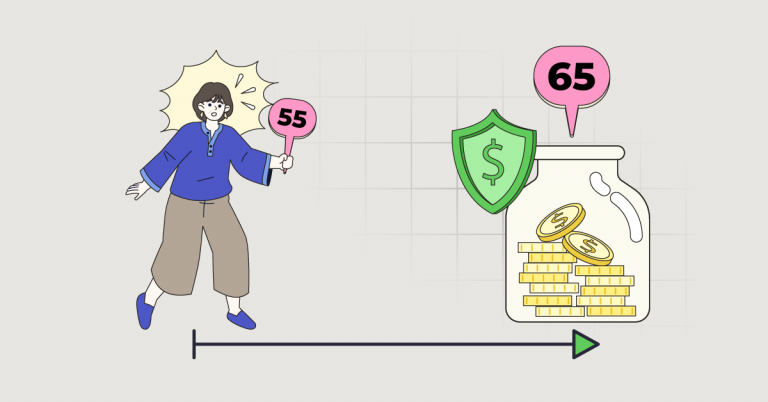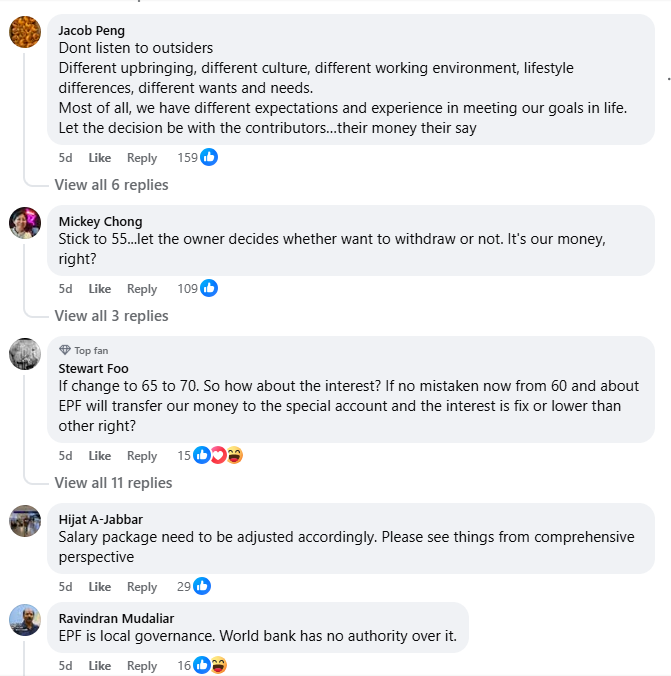EPF Withdrawal Age To 65? What Malaysians Need To Know About The World Bank’s Recommendation

Table of Contents
The World Bank has recommended raising Malaysia’s EPF full-withdrawal age beyond 55 to reflect longer lifespans and improve retirement adequacy. While the move could help Malaysians stretch their savings further and align with global norms, it also raises concerns about fairness for lower-income and physically demanding workers who may not be able to work longer. Experts say any change must be paired with better financial literacy, stronger protections, and higher savings contributions — so retirees can truly afford to enjoy their golden years.
For Malaysians who have been counting down to the long-awaited age of 55 to finally withdraw their hard-earned EPF savings, recent news have certainly given you cause for concern.
The World Bank recently recommended Malaysia to raise the full-withdrawal age for Employees Provident Fund (EPF) savings to better reflect how much longer we’re living and working today. It’s a bold idea that’s stirring up plenty of debate, especially among Malaysians who see age 55 as the start of their long-awaited retirement chapter.
Here’s the reality: Malaysians are living longer than ever, with life expectancy now around 75 years. Yet, most EPF members don’t have enough savings to last through those extra decades. As of late 2024, only about 36% of active contributors had reached the basic savings target of RM240,000 — a sum meant to sustain retirement needs until age 75. Even more concerning is the fact that the EPF is raising its basic savings target for retirement to RM390,000 by January 2028, as part of its new three-tier Retirement Income Adequacy (RIA) framework.
So, should we really keep the withdrawal age at 55 — a number set back when life expectancy was just 54 years? Or is it time to rethink how we balance access, adequacy, and financial freedom in our retirement system?
How The Current EPF Policy Works

The EPF is Malaysia’s main retirement savings scheme for private-sector workers. Every month, employees contribute 11% of their salary while employers top up at least 12%, helping members grow their savings through investments.
While members can withdraw part of their funds for housing, education, or healthcare (EPF Account 3), full withdrawal is allowed at age 55 — a rule that’s been around since the 1950s. Any savings after that age go into a separate Akaun Emas, which can only be accessed at 60.
But here’s the catch: that age limit was set when life expectancy was just 54 years. The issue arises from the fact that Malaysians are now living to around 75 years of age, yet many still retire — and withdraw their savings — two decades earlier. It’s a mismatch that’s raising questions about how sustainable the current system really is.
That’s why the World Bank is recommending Malaysia to review the policy. Their concern? Allowing early withdrawals may be leaving too many Malaysians with too little for their golden years.
Why Raising The EPF Withdrawal Age Might Make Sense
At first glance, waiting longer to access your own savings sounds unfair. But there are a few strong reasons why experts, which include the World Bank, believe it could actually help Malaysians in the long run.
It helps your money last longer
With people living well into their 70s and even 80s, retirement can now stretch over 20 years or more. Delaying full withdrawals means your savings have more time to grow through compounding returns — and less time to run out.
It boosts financial security
EPF data shows that many members deplete their savings within just a few years of retirement. Raising the withdrawal age gives workers a longer contribution window, improving their final balances and reducing the risk of falling into hardship later.
It reflects how Malaysia has changed
When the age limit was set, 55 made sense. But today, many Malaysians are still healthy, active, and working into their 60s. Aligning the withdrawal age with actual retirement patterns — or the official retirement age of 60 — makes the system more realistic.
It keeps Malaysia in step with global standards
Many developed countries allow access to pension savings at around 65, not 55. Moving closer to that range would bring Malaysia in line with international best practices, especially as we become an ageing society.
Why Raising The EPF Withdrawal Age Could Be A Problem
Still, not everyone agrees that pushing the EPF withdrawal age higher is the right move. For many Malaysians, especially those in lower-income or physically demanding jobs, it’s not just about saving more — it’s about survival and fairness.
Not everyone can work that long
It’s easy to say people are living longer, but not everyone is living healthier. Many in construction, manufacturing, or service jobs start working young and face health issues by their 50s. Expecting them to work until 65, or wait that long to access their own savings — can feel unfair.
Early withdrawals serve real needs
For some, EPF savings aren’t just for retirement. They help cover urgent needs. From children’s education to paying off debts or medical bills, restricting access could leave many Malaysians struggling in the short term.
It could hurt younger workers too
If older employees stay in the workforce longer, it may slow down promotions and limit job openings for younger workers. That’s a tricky balance in a country already concerned about youth unemployment.
The public may not accept it easily
After years of seeing 55 as the “retirement finish line,” raising the age could trigger strong pushback. In fact, The Star reports that a number of Malaysians have already voiced out against the World Bank recommendations. Many still see EPF money as their money — and any delay in accessing it might feel like moving the goalpost.
While raising the withdrawal age may make financial sense, it also needs to make human sense. Any change would have to consider fairness, flexibility, and how to protect vulnerable workers who simply can’t afford to wait.
What Is The Right Way Forward?
There really is no right or wrong answer with regards to this conundrum. On one hand — given the shifting demographics, low saving adequacy, and ever longer retirement duration, there is a reasonable case to raise the EPF withdrawal age to at least align with the retirement age as part of a package or reforms.
On the other hand, raising the EPF withdrawal age is not a silver bullet that will solve all our problems. In order to make it work effectively without disrupting the lives of vulnerable groups and retirees, raising the age will need to be accompanied by stronger savings, increased contribution rates, improved retirement income frameworks, better financial literacy, and targeted protections.
The main objective to keep in mind is not about delaying the enjoyment of savings, but ensuring that Malaysians have the savings that will last through their longer lives today. The withdrawal age for EPF must reflect the reality of lifespan and retirement needs; as well as the monetary obligations that retirees are still indebted to.
Frequently Asked Questions (FAQ)
No official change has been announced. The World Bank only recommended gradually raising the withdrawal age, but the government and EPF have not confirmed any move.
Because Malaysians are living longer and many deplete their savings too early, the World Bank says delaying full withdrawals could improve long-term financial security.
If any change happens, it’s likely to apply gradually or to future contributors — not to those who already retired or reached 55.
No. As of now, full withdrawal at age 55 and Akaun Emas access at 60 remain unchanged.
It could help your savings grow longer through compounding and reduce the risk of running out of money in old age.
Any change would come from the government through amendments to EPF regulations, based on policy decisions by the Finance Ministry and Parliament.
No. Raising the withdrawal age wouldn’t force you to keep working. It would only delay when you can fully access your EPF savings.










